Following our May 2018 Webinar, Selling Value from Qualification to Close, we began our standard Q&A session with our presenter, LeveragePoint’s Peyton Marshall, by reviewing the results of our recent Value Selling Survey and asking for his initial reactions. The survey was a short, 5-question inquiry passed around to our webinar audience to see what some prevailing views on value selling are. Here’s what went down:
Survey Question 1: What percent of your sales force sells on value?
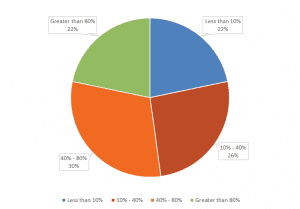
22% of respondents answered less than 10%, 26% said 10 to 40%, 30% indicated 40 to 80%, and 22% claimed greater than 80%. This just shows the varying stages B2B organizations are in, in their value journey.
Survey Question 2: How do your current value sellers tend to communicate value? (please check all that apply)
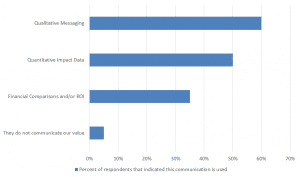
The results are expected, with the majority of value sellers using typical qualitative messaging. However, only about half discuss quantitative impact data, and even fewer use financial comparisons and ROI’s to communicate their value to the prospects.
Peyton, why is qualitative messaging used more than quantitative and financial messaging?
[Peyton’s response] There was a pro value audience for this particular survey, so one reason that there could be a lot more qualitative messaging and less financial, is because of content generation. It’s easier for product teams to generate qualitative messages than quantitative and financial comparisons. Often sales teams manage to generate their own which leads to a second important reason, which is content availability. Is it actually there when sales needs it? And that can be one reason that there’s a heavier reliance on qualitative messaging. The third reason is sales leadership. For example, sales leaders talking value, the c-suite talking value, and best practices being constantly brought up internally, which starts to drive greater use of value financially and quantitatively in the sales process.
Survey Question 3: Where in the sales cycle should you start communicating value?
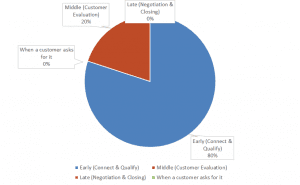
Forrester Research states, “the first vendor to succeed in communicating a vision to value,” wins the business 74% of the time. So don’t wait, start the value conversation right away.
Survey Question 4: What percent of your sales team talks financial value ROI, TCO, economic value?
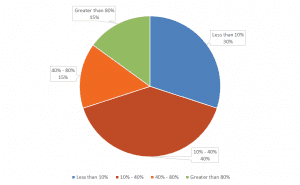
Over seventy percent of respondants indicated that less than half of their sales team is discussing financial value.
Peyton, what do you think is going on here?
[Peyton’s response] Given a very pro value audience, there are some important elements. The best sales representatives gravitate towards this tactic. Often we find, individuals in sales have been talking value well before product management started providing them with the tools. This can often be about driving a broader adoption and driving best practices into a sales force. In order to do that, sales leaders need to get engaged. They need to mobilize, they need to have internal drivers, and they need to talk success. That’s really the best way to make value selling go viral. They need to get people past their fears. So showing real examples and promoting them is all important.
Survey Question 5: Should you restrict value conversations to specialists, like solution consultants, subject matter experts, value engineers, etc.?
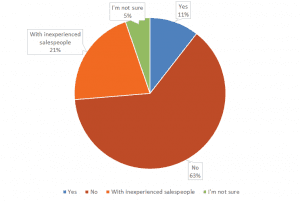
This was definitely the trickiest one. Peyton, what do you think about the responses here?
[Peyton’s response] Again, this question is specific to a very pro value audience.
- 63% answered “no”
- 21% responded “with inexperienced salespeople”
- 11% said “yes”
- 5% indicated “I’m not sure”
We’ve got the Driver’s Ed answer: 21% responded “with inexperienced salespeople,” which is not surprising. It is natural to think that less experienced people probably need to spend some time in the passenger’s seat just to get comfortable and get used to it, before they begin to do it themselves. This response indicates that the respondant believes in a pro value culture and pro early in the sales cycle kind of answer. Had we surveyed a broader audience, a less pro value audience, there may have been a greater percentage of those answering “yes.” In the broader community there’s a much greater prevailing notion that these conversations need to be confined to the specialists, and that value selling is for value engineers or maybe for pre-sales people. However, we think the best organizations do not restrict these conversations.
Watch Peyton’s full webinar, or download the slide deck HERE

